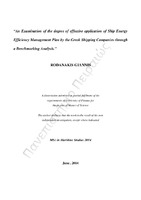An examination of the degree of effective application of ship energy efficiency management plan by the Greek shipping companies through a benchmarking analysis

Προβολή/
Θεματική επικεφαλίδα
Benchmarking (Management) ; Performance ; Competition ; Organizational effectiveness ; Shipping -- GreeceΠερίληψη
The present study focuses on the examination of the extent of effective application of the ship energy efficiency management plan by the Greek shipping companies vis-a-vis their international competitors and through a benchmarking analysis. The aim of this study is to evaluate and analyse the Greek shipping companies' management with the respect to effectiveness of their approach in SEEMP implementation. This aim is broken down into the following objectives which include: a) Examine the framework of new regulations regarding energy efficiency for the shipping industry; b) Analyse the main stages of and requirements for a ship Energy Efficiency Management Plan (SEEMP); c) Evaluate the benefits to implement the Ship Energy Efficiency Management Plan (SEEMP) especially with respect to the Greek shipping companies; d) Carry out a benchmarking analysis of the SEEMP implemented by Greek shipping companies; e) Identify and analyse gaps and make prospective recommendations for improvement. The main tools, examined in the literature review, used for the analysis purposes of this study and which have been applied to carry out the investigation and interpret primary research results include: relationship of the SEEMP with energy efficient management, SEEMP within the context of new regulations, the stages of SEEMP completion cycle, best practices for energy efficient shipping operations, Benchmarking principles and challenges for contemporary Greek shipping companies. Primary research data was drawn from a combination of quantitative and qualitative research methodologies. Primary research results were next statistically processed through the application of SPSS software (Version 20). Results drawn from investigation and primary research results (from survey and interviews) provided evidence that through their analysis and interpretation satisfied the study's objectives. The main conclusion drawn is that Greek shipping companies are distinguished into 'two-speed' companies with the leading ones being proactive, going beyond mere compliance and outperforming their international competitors while the 'followers' target mere compliance with the regulations. With respect to the areas that needfurther improvement, these include: a) Better implementation of Just - in time arrival/ reducing congestion; b) Installation of energy saving devices for propulsion and resistance improvement applicable to existing vessels; c) Good new building vessels with new hull no need any installation of energy savings; d) Companywide training/ awareness on SEEMP implementation and its beneficial prospects; e) Performance monitoring and development of qualified staff form SEEMP implementation/ staff motivation; f) Goal setting beyond compliance at the corporate level; g) External benchmarking; h) Reduction of fuel consumption of the order 200% is not impossible through LNG; i) Closing the 'loop' of SEEMP PDCA cycle through proper assessment and evaluation of SEEMP implementation and feeding back respective results to the planning stage of the next cycle, applying thus a dynamic approach; and k) Synergies with universities and other scientific to achieve further improvements. Finally, main suggestions for further research include: a) Expansion research basis by increasing the size of the sample of the Greek shipping, b) Repeating the research in a year or two so that more data will be available and safer conclusions can be drawn.


